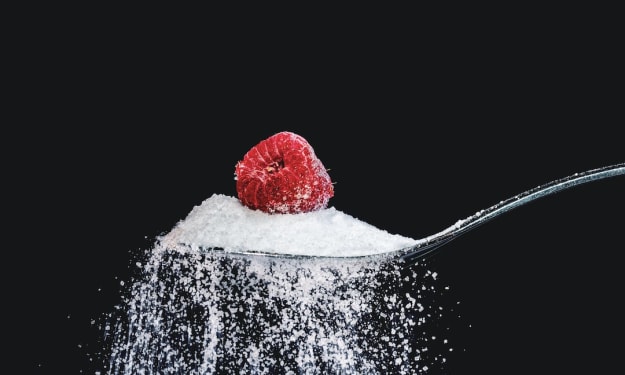How to Achieve a Healthy Prostate for Men
Special Offer: All-Herbal Prostate Regulator!

Special Offer: All-Natural Prostate Regulator!
How to Achieve a Healthy Prostate for Men: Herbs & Lifestyle Hacks
The prostate gland is an essential component of the male reproductive system, located below the bladder, in front of the rectum, and surrounds the urethra, the tube that carries urine from the bladder. The health of the prostate gland and urinary system is critical for men's overall wellbeing. As men age, the prostate gland may become enlarged, leading to various health problems. Therefore, it's essential to take care of your prostate to maintain good health and reduce the risk of developing prostate-related issues.
Special Offer: All-Natural Prostate Regulator!
Natural Herbs to Keep Your Prostate in Check:
While the health of the prostate gland and urinary system is critical for men's overall wellbeing. Fortunately, several natural supplements can help support the health of the prostate and urinary system, including nori yaki extract powder, wake extract, kelp powder, bladderwrack powder, saw palmetto, pomegranate extract, iodine, shilajit, and neem.
Nori Yaki Extract Powder: Nori yaki extract powder is derived from nori seaweed and is a rich source of antioxidants, vitamins, and minerals. Studies have shown that nori yaki extract powder has potent anti-inflammatory properties that can help reduce inflammation in the prostate gland and urinary system. Additionally, nori yaki extract powder may help improve urinary flow and reduce the symptoms associated with an enlarged prostate.
Wake Extract: Wake extract, also known as Japanese parsley, is a natural diuretic that can help improve urine flow and reduce urinary tract infections. Studies have shown that wake extract may also have anti-inflammatory properties that can help reduce inflammation in the prostate gland and urinary system.
Kelp Powder: Kelp powder is a type of seaweed that is rich in iodine, a mineral that is essential for the proper function of the thyroid gland and the prostate gland. Studies have shown that men with low levels of iodine are more likely to develop prostate cancer. Therefore, supplementing with kelp powder may help support the health of the prostate gland.
Bladderwrack Powder: Bladderwrack powder is another type of seaweed that is rich in iodine and other minerals that are essential for the proper function of the prostate gland and urinary system. Studies have shown that bladderwrack powder may also have anti-inflammatory properties that can help reduce inflammation in the prostate gland and urinary system.
Saw Palmetto: Saw palmetto is a type of palm tree that grows in the southeastern United States. It is a popular natural supplement used to support the health of the prostate gland. Studies have shown that saw palmetto may help reduce the symptoms associated with an enlarged prostate, such as urinary frequency and urgency.
Pomegranate Extract: Pomegranate extract is derived from the fruit of the pomegranate tree and is rich in antioxidants that can help reduce inflammation in the prostate gland and urinary system. Studies have shown that pomegranate extract may also help reduce the risk of developing prostate cancer.
Iodine: Iodine is a mineral that is essential for the proper function of the thyroid gland and the prostate gland. Studies have shown that men with low levels of iodine are more likely to develop prostate cancer. Therefore, supplementing with iodine may help support the health of the prostate gland.
Shilajit: Shilajit is a natural substance that is found in the Himalayan mountains and is rich in minerals and antioxidants. Studies have shown that shilajit may help improve prostate health by reducing inflammation and oxidative stress in the prostate gland.
Neem: Neem is a natural herb that is native to India and is commonly used in Ayurvedic medicine to treat a variety of health conditions. Studies have shown that neem may have anti-inflammatory properties that can help reduce inflammation in the prostate gland and urinary system.
Special Offer: All-Natural Prostate Regulator!
The best ways to keep your prostate healthy:
Eat a healthy diet: A balanced diet is crucial for maintaining overall health, and it's no different when it comes to prostate health. Incorporate a variety of fruits, vegetables, whole grains, and lean protein sources into your diet. Limit your intake of red meat and high-fat foods, as they may increase the risk of prostate problems.
Stay hydrated: Drinking plenty of water and other fluids can help flush out toxins from the body and promote prostate health. Aim to drink at least 8-10 glasses of water per day.
Exercise regularly: Exercise is essential for maintaining good health and reducing the risk of developing prostate-related problems. Regular physical activity can also help maintain a healthy weight, which is beneficial for prostate health.
Get enough sleep: Adequate sleep is essential for overall health, including prostate health. Aim for 7-8 hours of sleep each night to help your body rest and recover.
Reduce stress: Chronic stress can lead to a variety of health problems, including prostate issues. Find ways to manage stress, such as practicing relaxation techniques like meditation or yoga.
Don't smoke: Smoking has been linked to an increased risk of prostate cancer and other health problems. Quitting smoking is essential for maintaining good health.
Maintain a healthy weight: Being overweight or obese can increase the risk of developing prostate-related problems. Maintain a healthy weight by eating a balanced diet and exercising regularly.
Get regular check-ups: Regular check-ups with your doctor can help detect prostate problems early on. It's recommended that men over 50 get a prostate-specific antigen (PSA) test and a digital rectal exam (DRE) every year.
There are tons of over-the-counter pills that contain all sorts of junk and can cause other issues. If you think your prostate does not have cancer, but just needs some love from these herbs--it can only help. In the case that you may think it is more serious, below are the typical symptoms of prostate cancer.
Special Offer: All-Natural Prostate Regulator!
Prostate cancer is the second most common cancer in men worldwide, after lung cancer. While many cases of prostate cancer develop slowly and do not cause any symptoms, some cases can be more aggressive and may present with a variety of symptoms.
1. Urinary Symptoms - Urinary symptoms are among the most common symptoms of prostate cancer. The prostate gland surrounds the urethra, which is the tube that carries urine from the bladder out of the body. As the prostate gland grows, it can squeeze the urethra, causing a variety of urinary symptoms.
These symptoms can include:
- Frequent urination, particularly at night (also known as nocturia)
- Difficulty starting urination or a weak urine stream
- A feeling of incomplete emptying of the bladder
- Urinary urgency (the sudden and strong urge to urinate)
While these symptoms can be caused by a number of conditions other than prostate cancer (such as an enlarged prostate), men who experience these symptoms should seek medical attention.
2. Blood in the Urine or Semen - Blood in the urine or semen can be a sign of prostate cancer, although it is a less common symptom. Blood in the urine may appear pink, red, or brown, while blood in the semen may appear as small red or brownish dots. Men who notice blood in their urine or semen should see a doctor, as this can also be a sign of other medical conditions.
3. Painful Ejaculation or Difficulty Achieving an Erection - Prostate cancer can also cause sexual symptoms. Men with prostate cancer may experience painful ejaculation or difficulty achieving an erection. These symptoms can be caused by a number of conditions, so it is important to see a doctor to determine the underlying cause.
4. Back Pain - Prostate cancer can sometimes spread to the bones, including the bones of the spine. When this happens, it can cause back pain that is persistent and does not go away with rest or over-the-counter pain medications. Men who experience back pain that is not explained by a specific injury or activity should see a doctor to determine the underlying cause.
5. Fatigue - Fatigue is a common symptom of many medical conditions, including prostate cancer. Men with prostate cancer may experience fatigue that is not relieved by rest or sleep. While fatigue can be caused by a number of conditions, it is important to see a doctor to determine the underlying cause.
6. Unexplained Weight Loss - Unexplained weight loss can be a sign of prostate cancer that has spread beyond the prostate gland. This weight loss can occur even if the man is eating normally. Men who experience unexplained weight loss should see a doctor to determine the underlying cause.
It is important to note that many cases of prostate cancer do not cause any symptoms at all. This is why regular prostate cancer screening is so important, particularly for men over the age of 50 or those with a family history of the disease. Prostate cancer screening typically involves a blood test to check for elevated levels of a protein called prostate-specific antigen (PSA) and a digital rectal exam (DRE), in which a doctor checks the size and shape of the prostate gland.
Last Chance! Special Offer: All-Natural Prostate Regulator!
About the Creator
Reliable Goods
We love writing about topics that are informative, credible & accurate!





Comments (1)
Fantastic!